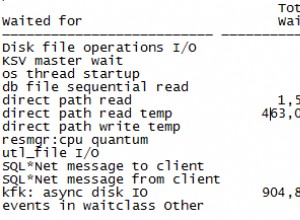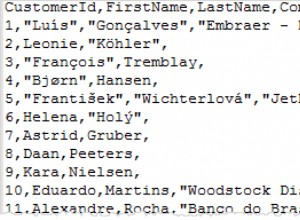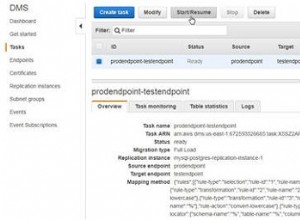J'ai utilisé cet exemple de table pour rendre la requête plus lisible :
create table my_table(id serial primary key, jdata jsonb);
insert into my_table (jdata) values
('{
"key1": {
"key2": [
{
"key3": "test3",
"key4": "test4"
}
]
},
"key5": [
{
"key6":
[
{
"key7": "test7"
}
]
}
]
}');
Vous devez joindre les deux jsonb_each(value) et jsonb_array_elements(value) conditionnellement, selon le type de value :
with recursive extract_all as
(
select
key as path,
value
from my_table
cross join lateral jsonb_each(jdata)
union all
select
path || '.' || coalesce(obj_key, (arr_key- 1)::text),
coalesce(obj_value, arr_value)
from extract_all
left join lateral
jsonb_each(case jsonb_typeof(value) when 'object' then value end)
as o(obj_key, obj_value)
on jsonb_typeof(value) = 'object'
left join lateral
jsonb_array_elements(case jsonb_typeof(value) when 'array' then value end)
with ordinality as a(arr_value, arr_key)
on jsonb_typeof(value) = 'array'
where obj_key is not null or arr_key is not null
)
select *
from extract_all;
Sortie :
path | value
--------------------+------------------------------------------------
key1 | {"key2": [{"key3": "test3", "key4": "test4"}]}
key5 | [{"key6": [{"key7": "test7"}]}]
key1.key2 | [{"key3": "test3", "key4": "test4"}]
key5.0 | {"key6": [{"key7": "test7"}]}
key1.key2.0 | {"key3": "test3", "key4": "test4"}
key5.0.key6 | [{"key7": "test7"}]
key1.key2.0.key3 | "test3"
key1.key2.0.key4 | "test4"
key5.0.key6.0 | {"key7": "test7"}
key5.0.key6.0.key7 | "test7"
(10 rows)
Les éléments des tableaux json n'ont pas de clés, nous devrions utiliser leurs index pour construire un chemin. Donc la fonction jsonb_array_elements() doit être appelé avec ordinarité. Selon la documentation
(voir 7.2.1.4. Fonctions de table ):
L'appel de fonction
jsonb_array_elements(case jsonb_typeof(value) when 'array' then value end)
with ordinality as a(arr_value, arr_key)
renvoie les paires (value, ordinality) alias (arr_value, arr_key) .




